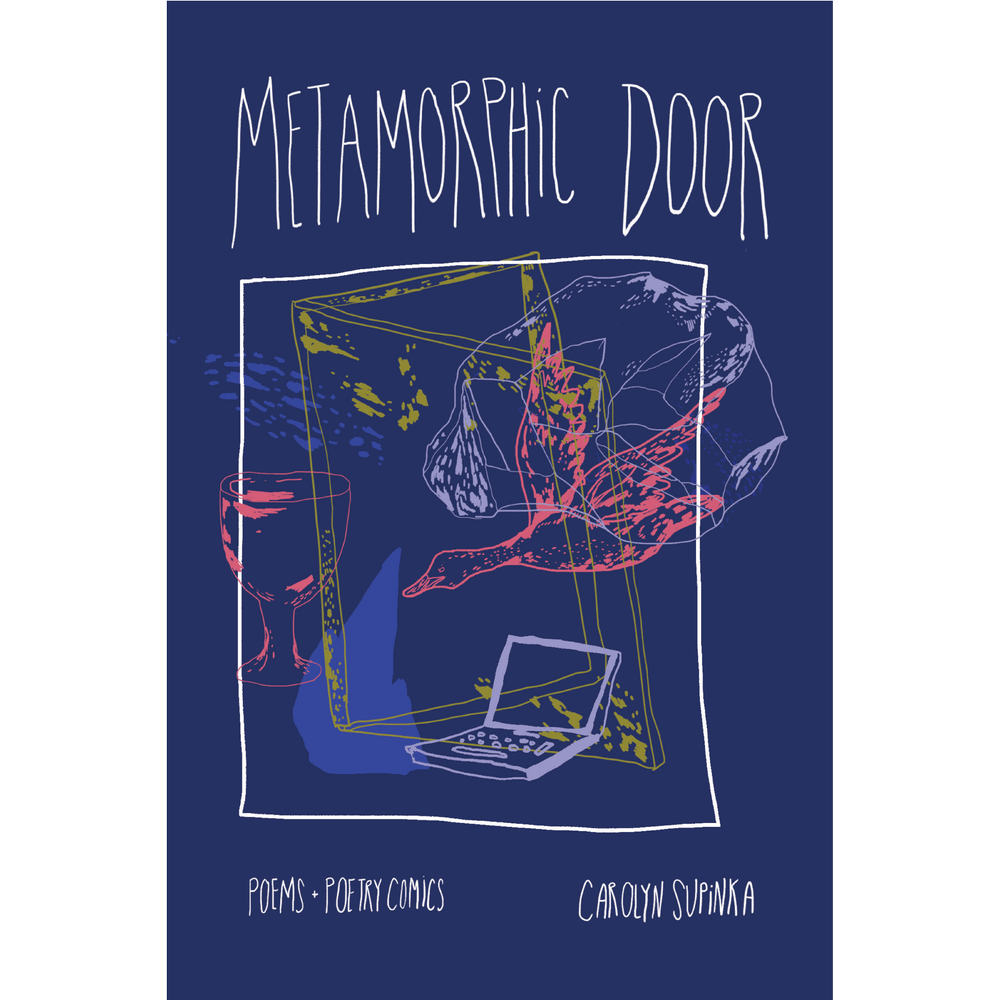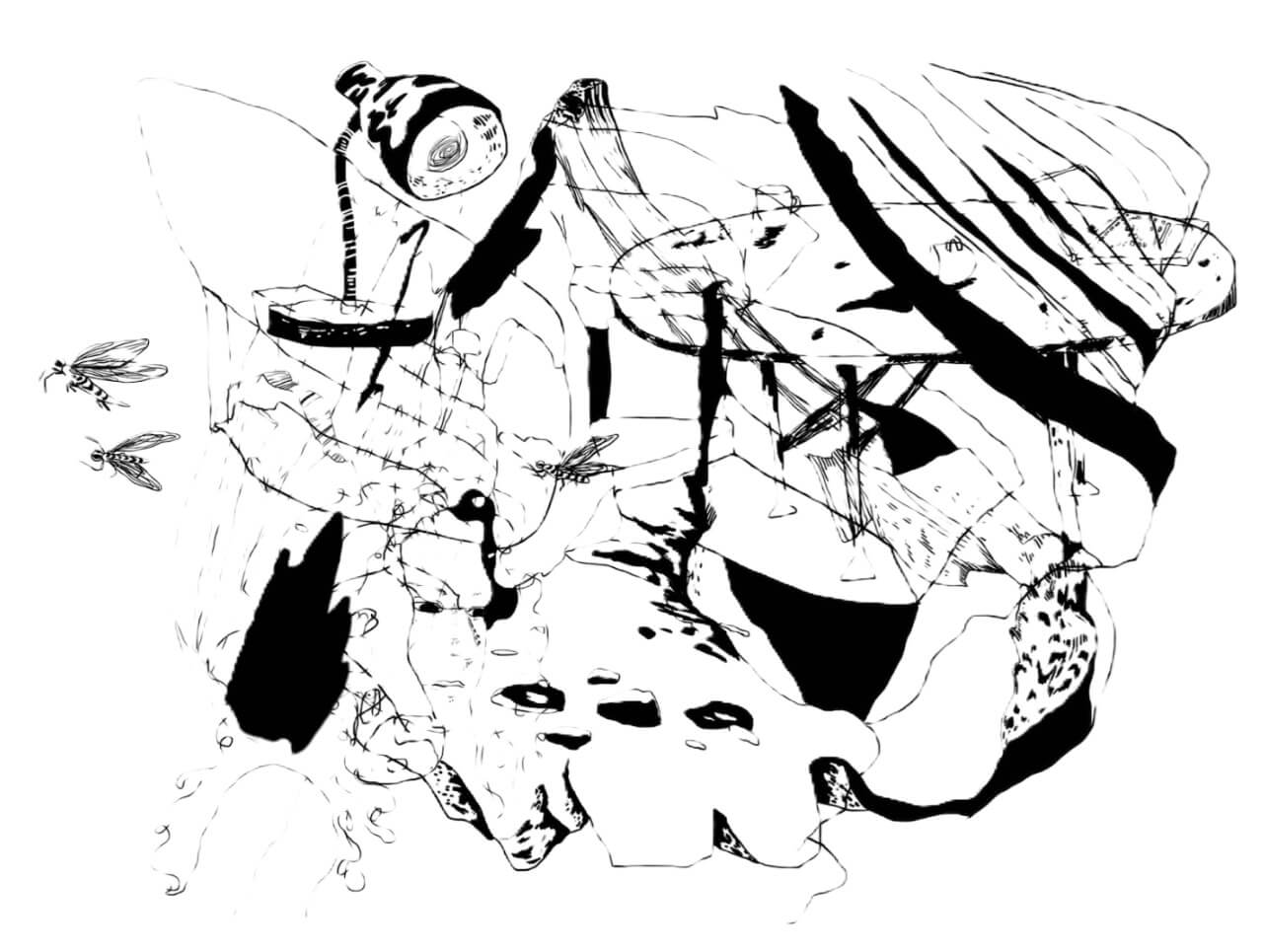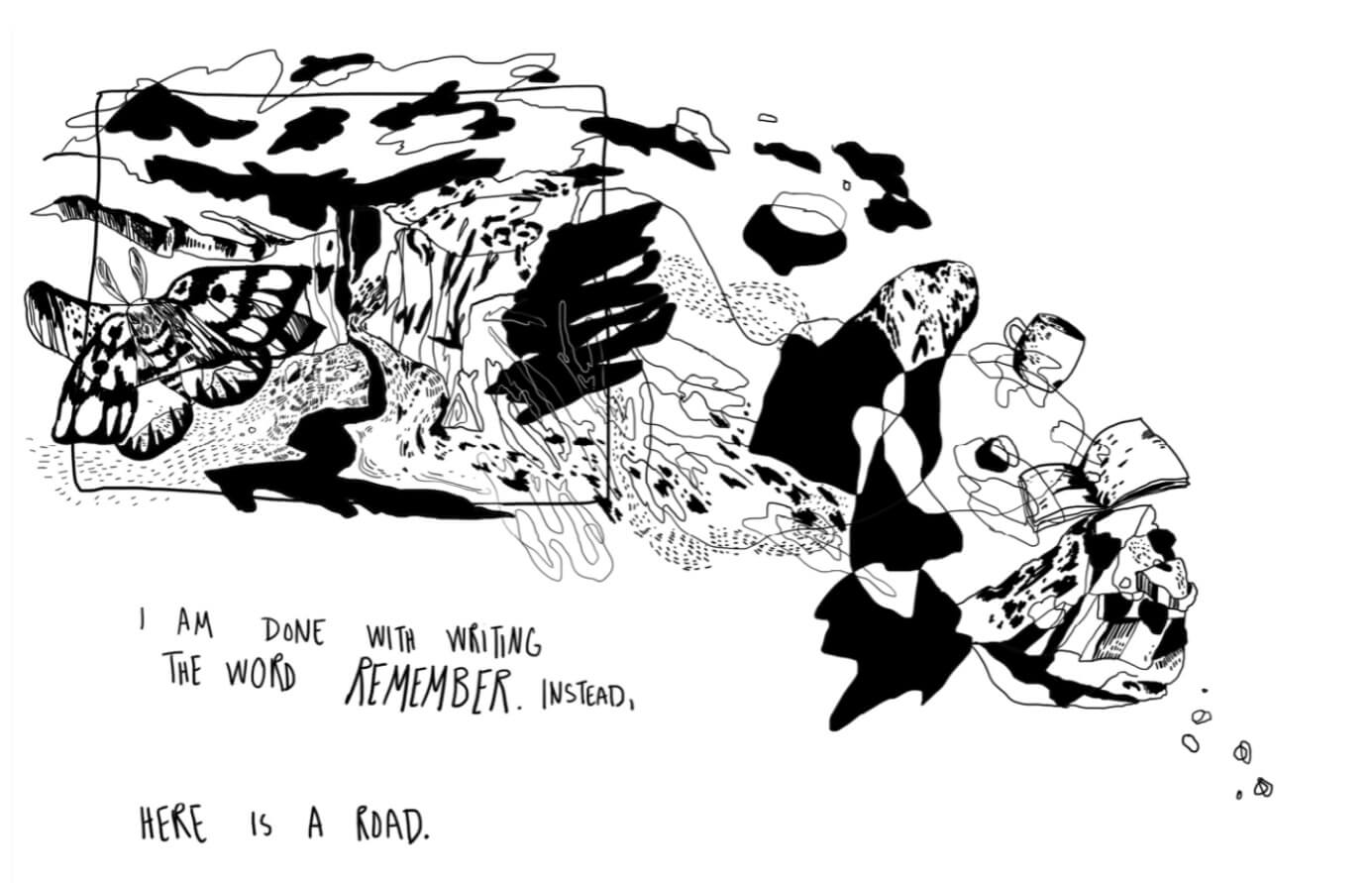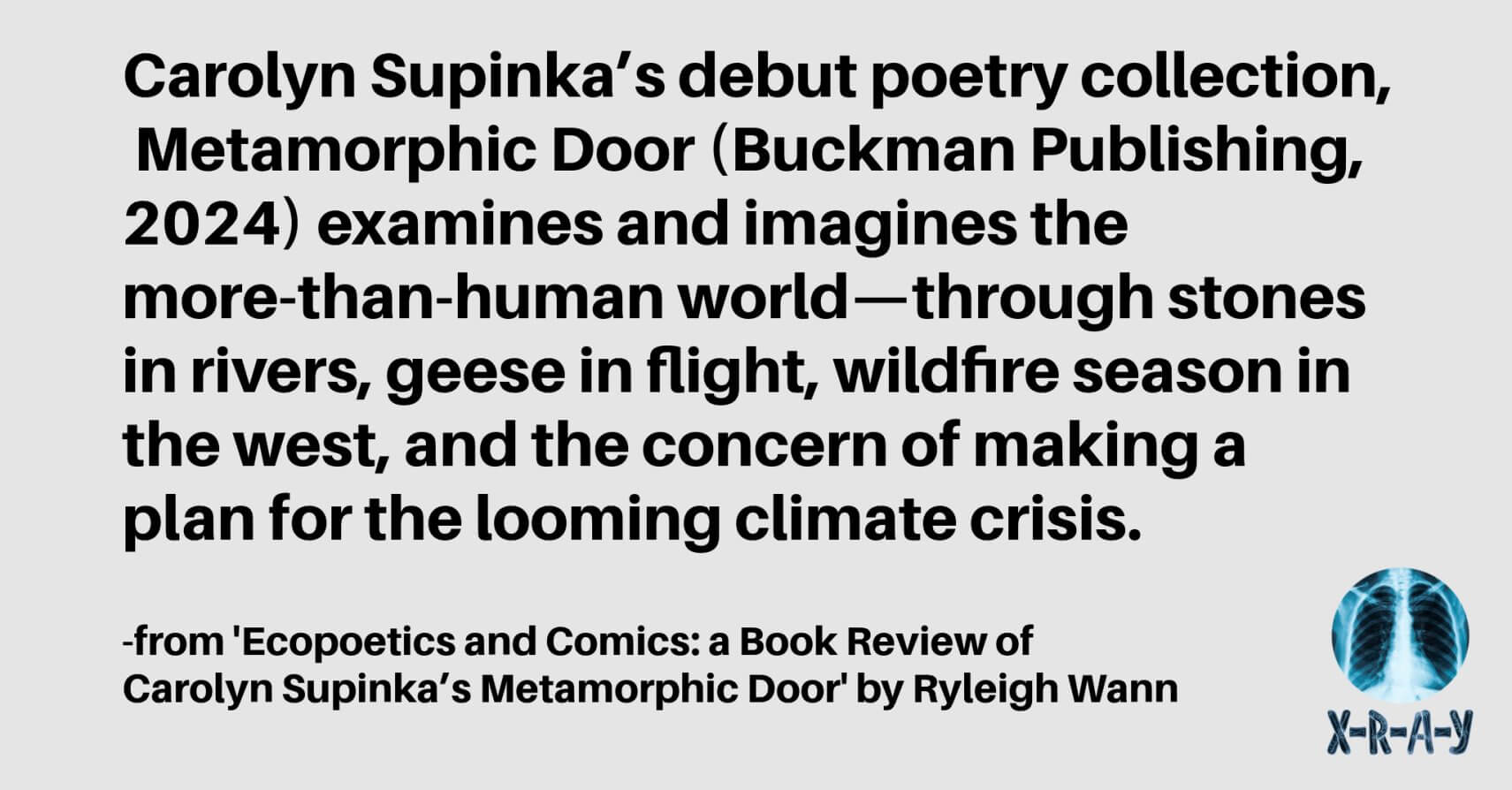 Carolyn Supinka’s debut poetry collection, Metamorphic Door (Buckman Publishing, 2024) examines and imagines the more-than-human world—through stones in rivers, geese in flight, wildfire season in the west, and the concern of making a plan for the looming climate crisis. These poems are introspective, as if the speaker’s inner monologue and cyclical thinking are displayed on the page—similar to reading someone’s journal. They also remain all too relatable for anyone carrying the weight of environmental concerns. That said, this collection isn’t all doom and gloom. It balances anxiety-inducing climate changes with poems that marvel at the awestruck wonder this planet provides, even in its burning. The poem “Can you wake me for the meteor shower” begins with ‘At two AM, staring into the city-bleached night / I saw one and screamed at the sudden dazzling.’ Metamorphic Door holds poems of worldly curiosities, thoughts on relationships, and self-reflection. It beholds something for everyone.
Carolyn Supinka’s debut poetry collection, Metamorphic Door (Buckman Publishing, 2024) examines and imagines the more-than-human world—through stones in rivers, geese in flight, wildfire season in the west, and the concern of making a plan for the looming climate crisis. These poems are introspective, as if the speaker’s inner monologue and cyclical thinking are displayed on the page—similar to reading someone’s journal. They also remain all too relatable for anyone carrying the weight of environmental concerns. That said, this collection isn’t all doom and gloom. It balances anxiety-inducing climate changes with poems that marvel at the awestruck wonder this planet provides, even in its burning. The poem “Can you wake me for the meteor shower” begins with ‘At two AM, staring into the city-bleached night / I saw one and screamed at the sudden dazzling.’ Metamorphic Door holds poems of worldly curiosities, thoughts on relationships, and self-reflection. It beholds something for everyone.
What I find most engaging about Supinka’s collection is how it’s paired with her artwork. Metamorphic Door is a book of poetry and poetic comics, bringing these words even more to life. While reading this collection, I kept wondering: how does artwork intertwined with poems impact the language? How does it further give these poems power? Are these comics their own poems, or do they only hold power within the context of the words on the next page? To me, it felt like an act of trust to read someone’s most intimate thoughts on the page, and the comics made it feel even more vulnerable by showing a reflection of who the poet/artist was at the time of writing this—it offers a deeper understanding of the way she views the world. With this collection, Supinka is saying, “This is how I see our world—do you see it, too?” The collection opens with a comic that sprawls across a few pages and shows infinite linework featuring things like houses, legs, moths, and wine glasses. The final words of the comic set up the tone for the rest of the poems: ‘I am done with writing / the word remember. Instead, / here is a road.’ The drawing spills from a square frame onto the next page, with rocks (circles? Tiny planets?) getting smaller and smaller before the white space.
I first interacted with Supinka’s work while serving as the comics editor for Ecotone, the award-winning literary magazine that reimagines place. I found Supinka’s comics online and knew I wanted to solicit her art for the lit-mag, which had started publishing comics again. I remember being compelled and somewhat unnerved by the artwork and language—these were concerns that were constantly on my mind, especially during the height of the pandemic. I was doom-scrolling on my phone or wondering about the logistics and skills I might need to someday live off the land—I can barely start a fire and lack a green thumb, and these worries infiltrated my thoughts while trying to sleep at night. Supinka’s fine-lined artwork contrasted with the daily expectations of operating under the long emergency of climate change, which was something I hadn’t quite experienced in poetry before. Her debut delivers on these themes with an identifiable voice and craft of comics; they consider our existence on this big rock, and her poetry comics in tandem with language are a refreshing, honest, and inspiring way to articulate a concern that is occurring in real time.

Ecopoetry, in simplest terms, is a poem that delivers a message and is focused on environmental concerns. While this is not a new way to write poetry, the term has gained more attention in recent years. There are plenty of excellent sources on ecopoetics out there, but John Shoptaw’s essay in Poetry Foundation does a good job of exploring ecopoetry in detail. To summarize with a quote: “Ecopoetry doesn’t supplant nature poetry but enlarges it.” Metamorphic Door is a book of enlarged, nature poems with a delightful pairing of artwork. The collection is split into parts with comics planted throughout—artwork that feels like it spills off the page and into your lap. The comics are chaotically at ease in the sense that the linework is scribble-like in some moments (a woman with an infinity line leading to a table, a lamp, the things going on in her mind) but evoke relatable emotions, and I continue to find new meaning within the art. These drawings are exploring, sprawling, searching, and reaching out to the reader, providing a sense of comradery and comfort in this landscape.
For readers who are interested in research, Metamorphic Door also includes an index in the book. When was the last time you read an index in a poetry book that wasn’t a book on craft? The index is poetic in and of itself—a full catalog of terms and pages, of course, but also poetic definitions and ponderings. Take the word “Dune” for example: “The difficulty of abundance, a life in which the landscape is transformed as soon as you are in it.” Words like “ghost,” “karst,” and “night” have micro-poems beside them and lovely, little comics, like a spilled mug releasing butterflies—or moths—depending on how you choose to interpret it. The definition of “Threshold” has a drawing of a doorframe on fire, followed by page numbers.

I’d recommend Supinka’s collection to anyone who likes to read multiple books at once. I found the conversation between Metamorphic Door and Franny Choi’s The World Keeps Ending, and the World Goes On (HarperCollins, 2022) to be both heavy and cathartic. These poems beg the question: what does it look like to love the world around us? US poet laureate, Ada Limón, recently edited and wrote the introduction for an anthology of nature poems titled You Are Here (Milkweed, 2024). Nature poetry or ecopoems are needed now, perhaps more than ever. Air pollution from bombs, food waste, ocean acidification, deforestation, technology that uses resources at alarming rates, and global warming from fossil fuels—all rampant problems. I don’t have an answer to combating all of it, but I do have an enormous amount of trust in readers and writers to accomplish meaningful, action-oriented work. Knowing that poets are concerned with the environment—and will continue to use language as a tool to spread urgency and awareness—makes me feel hopeful and inspired for what’s to come, despite the challenges writers face in an industry that feels like it is, at times, against us (thanks, AI). To read a collection like Metamorphic Door makes me grateful to know there are writers who value the natural beauty of their surroundings to such an extent, that they will never stop celebrating and defending it.
Artworks excerpted from Metamorphic Door, published by Buckman Publishing © 2024. Used with permission.

